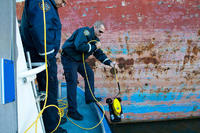-
Spike in violent incidents in hospitals

Over the past decade, hospitals across the nation have been subject to an alarming increase in violent incidents; in the last five years alone, there has been nearly a 300 percent increase in the number of reported homicides, assaults, and rapes compared to the previous five years
-
-
DHS IG: Cook County communications program botched

On Monday the DHS Inspector General blasted officials in Cook County, Illinois for mishandling a $45 million federally funded project to upgrade communications equipment for first responders; the Inspector General said the Cook County program, dubbed Project Shield, was fraught with trouble from the start, resulted in equipment that did not work, and potentially wasted millions of taxpayers’ dollars
-
-
LA sheriff department upgrading its 1980-era terminals
The Los Angeles Sheriff Department is upgrading its 1980s-era terminals, for which it had become difficult for the largest sheriff’s agency in the United States to find parts; the upgrade – Raytheon’s Mobile Digital Computer System (MDCS); the MDCS project and major technology upgrade represents the largest-ever deployment of mobile digital computers to a sheriff’s department in the country
-
-
Emergency responders prepare for chaotic New Year’s Eve
Emergency responders across the nation are gearing up for another busy New Year’s; each year the holiday sends overly enthusiastic revelers to the emergency room with alcohol-fueled deaths and injuries, but this New Year’s is expected to be particularly chaotic as it falls on a Saturday, giving party-goers all day to imbibe and a full day to recover
-
-
Buffalo – second best prepared city in U.S. for disasters
Buffalo, New York was recently declared the second best prepared city in the United States for a major terrorist attack or disaster in terms of public health
-
-
NY counties receive money to prepare for emergencies
The magnitude of Hurricane Irene and Tropical Storm Lee posed serious communications challenges to the response and recovery efforts among many New York counties; these counties are now receiving $20 million in funding to help localities better respond to emergency situations
-
-
Underwater drones help NYPD secure harbor

The New York Police Department (NYPD) has a new high-tech ally in its fight to keep the city safe from terrorists; to help sweep the city’s waterways and bridges of dangerous bombs, the NYPD’s Harbor Unit recently acquired six unmanned underwater drones that help sniff out explosives
-
-
Atlanta debuts new emergency communications systems
Last week first responders in Atlanta, Georgia gained a valuable new tool in helping to reduce 911 response times and improve communication during a disaster
-
-
New York moves swiftly to spend Hurricane disaster funds
Less than a week after Hurricane Irene blasted New York with wind and rain, state emergency officials had authorized disaster relief funds and were swiftly distributing them to hard hit farmers and residents
-
-
Another foreign executive arrested in Alabama on immigration charges
For the second time in recent weeks, Alabama law enforcement officials arrested a foreign car manufacturing executive under the state’s strict new immigration law
-
-
Supreme Court to hear Arizona immigration law
On Monday the Supreme Court announced that it would weigh in on the controversial debate surrounding Arizona’s hotly contested immigration law
-
-
Grant helps Kentucky dive team operate without sight
Rescue and recovery divers often struggle to perform their duties in murky, muddy waters, but thanks to a $21,000 grant from Kentucky’s Homeland Security department, the city of Grayson was able to purchase a side-scan sonar and an underwater metal detector to help rescue divers complete their mission in low visibility conditions
-
-
Officials say D.C. prepared for disasters following earthquake and snowstorm
This year a massive snowstorm and earthquake left D.C. residents stuck in traffic for hours as they attempted to leave the city, but emergency officials say they are better prepared for future disasters because of those incidents
-
-
Yellow Dot gets medical info to first responders fast

Emergency officials in Alabama recently introduced a new program aimed at quickly providing first responders with critical information during accidents; in the event of a car accident, first responders will be able immediately to find vital medical information on victims by simply looking in their glove compartment
-
-
Florida’s falling crime rate has experts puzzled
With unemployment at record highs and police departments struggling with budget cuts, the fact that Florida’s crime rate has fallen nearly 33 percent in the last decade has many experts puzzled
-
More headlines
The long view
Smaller Nuclear Reactors Spark Renewed Interest in a Once-Shunned Energy Source
In the past two years, half the states have taken action to promote nuclear power, from creating nuclear task forces to integrating nuclear into long-term energy plans.
